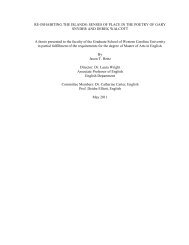SUMMERS, KAREN CRADY, Ph.D. Reading Incest - The University ...
SUMMERS, KAREN CRADY, Ph.D. Reading Incest - The University ...
SUMMERS, KAREN CRADY, Ph.D. Reading Incest - The University ...
You also want an ePaper? Increase the reach of your titles
YUMPU automatically turns print PDFs into web optimized ePapers that Google loves.
104<br />
potential problem of having a female as monarch is quickly converted in a conservative<br />
expression of the upholding of the established, God-approved social order—patriarchy.<br />
<strong>The</strong> upholding of patriarchy is again reaffirmed in John Webster’s 1612 revenge<br />
tragedy <strong>The</strong> Duchess of Malfi, but with a very different outcome. <strong>The</strong> old order is not<br />
restored in a happy ending. In fact, to those who desire to maintain traditional social<br />
order, the outcome is the worst possible—the son of a lowly steward sits on the throne.<br />
Other revenge tragedies such as Hamlet, <strong>The</strong> Spanish Tragedy, and ‘Tis Pity She’s a<br />
Whore also include the conventions of madness, violence, and murder, but <strong>The</strong> Duchess<br />
of Malfi is distinctive because of a peculiar manifestation of lunacy. In this play¸<br />
Gower’s worst fears come to fruition; the beast breaks through the restraints of reason<br />
and self-control and emerges to bring disaster to the entire court. Elizabethan and<br />
Jacobean revenge tragedy is informed by the plays of Seneca—bloody revenge, ghostly<br />
visitations, mutilation, insanity real or feigned, a play-within-a-play, and violent deaths—<br />
in the way that much medieval literature is informed by Ovid and other classical authors.<br />
<strong>The</strong> desire for revenge sometimes begins to seem like a semi-religious quest that must be<br />
accomplished at any cost, even the death of the avenger. <strong>The</strong> avenger may be motivated<br />
to act by the injustice of the crime committed against him. This injustice, unaddressed,<br />
may drive him to the brink of insanity, as in Hamlet, where the ghost of the murdered<br />
king commands the prince to “Revenge [my] foul and most unnatural murder” (Hamlet<br />
I.5.30). But the introduction of mad, perverted sexual desire in <strong>The</strong> Duchess of Malfi<br />
adds a new and sinister element to the mix.
















